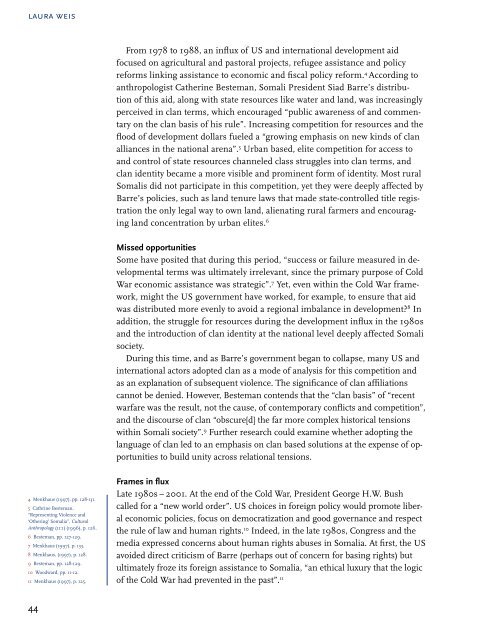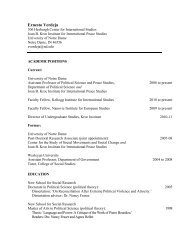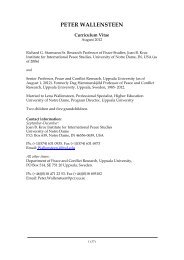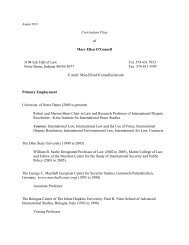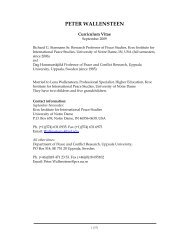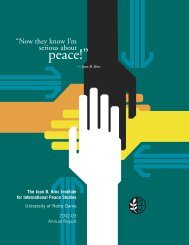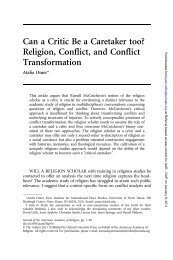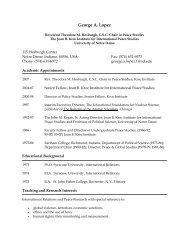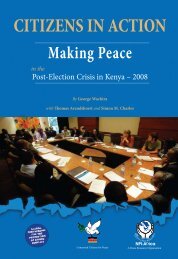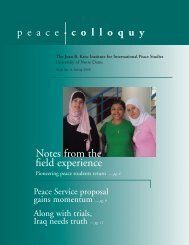Somalia: Creating Space for Fresh Approaches to Peacebuilding
Somalia: Creating Space for Fresh Approaches to Peacebuilding
Somalia: Creating Space for Fresh Approaches to Peacebuilding
You also want an ePaper? Increase the reach of your titles
YUMPU automatically turns print PDFs into web optimized ePapers that Google loves.
laura weis<br />
4 Menkhaus (1997), pp. 128-131.<br />
5 Cathrine Besteman,<br />
“Representing Violence and<br />
‘Othering’ <strong>Somalia</strong>”, Cultural<br />
Anthropology (11:1) (1996), p. 126.<br />
6 Besteman, pp. 127-129.<br />
7 Menkhaus (1997), p. 133.<br />
8 Menkhaus, (1997), p. 128.<br />
9 Besteman, pp. 128-129.<br />
10 Woodward, pp. 11-12.<br />
11 Menkhaus (1997), p. 125.<br />
44<br />
From 1978 <strong>to</strong> 1988, an influx of US and international development aid<br />
focused on agricultural and pas<strong>to</strong>ral projects, refugee assistance and policy<br />
re<strong>for</strong>ms linking assistance <strong>to</strong> economic and fiscal policy re<strong>for</strong>m. 4 According <strong>to</strong><br />
anthropologist Catherine Besteman, Somali President Siad Barre’s distribution<br />
of this aid, along with state resources like water and land, was increasingly<br />
perceived in clan terms, which encouraged “public awareness of and commentary<br />
on the clan basis of his rule”. Increasing competition <strong>for</strong> resources and the<br />
flood of development dollars fueled a “growing emphasis on new kinds of clan<br />
alliances in the national arena”. 5 Urban based, elite competition <strong>for</strong> access <strong>to</strong><br />
and control of state resources channeled class struggles in<strong>to</strong> clan terms, and<br />
clan identity became a more visible and prominent <strong>for</strong>m of identity. Most rural<br />
Somalis did not participate in this competition, yet they were deeply affected by<br />
Barre’s policies, such as land tenure laws that made state-controlled title registration<br />
the only legal way <strong>to</strong> own land, alienating rural farmers and encouraging<br />
land concentration by urban elites. 6<br />
Missed opportunities<br />
Some have posited that during this period, “success or failure measured in developmental<br />
terms was ultimately irrelevant, since the primary purpose of Cold<br />
War economic assistance was strategic”. 7 Yet, even within the Cold War framework,<br />
might the US government have worked, <strong>for</strong> example, <strong>to</strong> ensure that aid<br />
was distributed more evenly <strong>to</strong> avoid a regional imbalance in development? 8 In<br />
addition, the struggle <strong>for</strong> resources during the development influx in the 1980s<br />
and the introduction of clan identity at the national level deeply affected Somali<br />
society.<br />
During this time, and as Barre’s government began <strong>to</strong> collapse, many US and<br />
international ac<strong>to</strong>rs adopted clan as a mode of analysis <strong>for</strong> this competition and<br />
as an explanation of subsequent violence. The significance of clan affiliations<br />
cannot be denied. However, Besteman contends that the “clan basis” of “recent<br />
warfare was the result, not the cause, of contemporary conflicts and competition”,<br />
and the discourse of clan “obscure[d] the far more complex his<strong>to</strong>rical tensions<br />
within Somali society”. 9 Further research could examine whether adopting the<br />
language of clan led <strong>to</strong> an emphasis on clan based solutions at the expense of opportunities<br />
<strong>to</strong> build unity across relational tensions.<br />
Frames in flux<br />
Late 1980s – 2001. At the end of the Cold War, President George H.W. Bush<br />
called <strong>for</strong> a “new world order”. US choices in <strong>for</strong>eign policy would promote liberal<br />
economic policies, focus on democratization and good governance and respect<br />
the rule of law and human rights. 10 Indeed, in the late 1980s, Congress and the<br />
media expressed concerns about human rights abuses in <strong>Somalia</strong>. At first, the US<br />
avoided direct criticism of Barre (perhaps out of concern <strong>for</strong> basing rights) but<br />
ultimately froze its <strong>for</strong>eign assistance <strong>to</strong> <strong>Somalia</strong>, “an ethical luxury that the logic<br />
of the Cold War had prevented in the past”. 11


